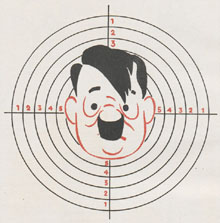Resistance Literature
A collection of the Erfgoed van de Oorlog
This collection includes poems and books that were published illegally in the Netherlands during World War II. The items range from high-quality literature to the little amateur poems that accompany presents on the Dutch feast of St. Nicholas: a good opportunity for their writers to gibe the occupying forces. These unique publications are now accessible online through The Memory. Taken together, they draw a picture of literary resistance in war time.
Once they had occupied the Netherlands, the Germans almost immediately took measures in order to ‘align' public life with National Socialist ideology. This policy implied that democratic utterances and freedom of speech were nearly completely banned. Literary freedom was also curtailed. The Departement voor Volksvoorlichting en Kunsten-DVK (Agency for public information and the arts) was instituted as early as November 1940. It included a special Afdeling voor het Boekwezen (Division for the book business), whose task it was to ensure that literary manifestations remained within the boundaries of what the National Socialists deemed acceptable.
In spite of the creation of a ‘Letters Guild', the membership of which was compulsory for authors, and notwithstanding paper allocations, censorship, and other rules imposed by the DVK, literary life never got fully ‘aligned'. Outside the official circuit, well-known and unknown writers continued to publish poems and books underground. This was not without risk: those who fell into the hands of the occupying forces ran the risk of being executed, as happened to the painter and publisher Hendrik Nicolaas Werkman in Groningen.
Joint venture
This nationale collection of printed propaganda is the result of a joint venture between the Koninklijke Bibliotheek and the NIOD Institute for War, Holocaust and Genocide Studies.

